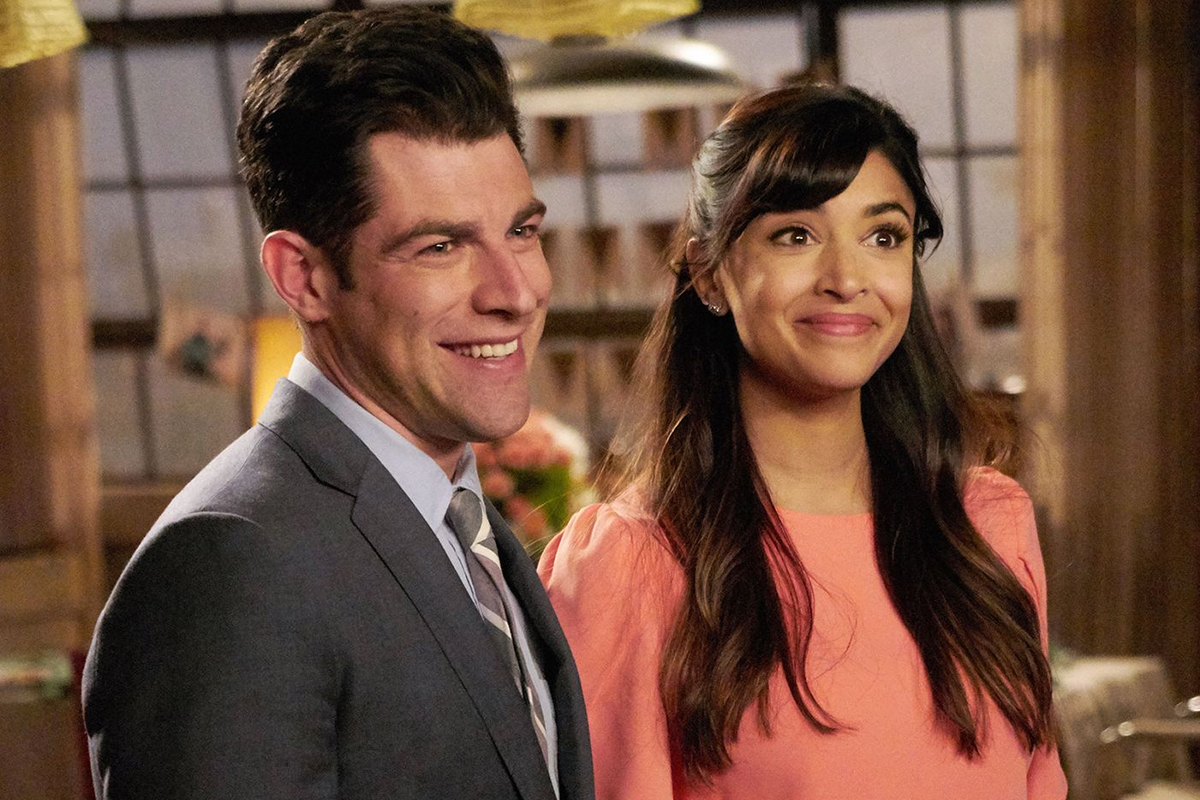Schmidt and Cece's relationship was the first time I felt represented on TV as a patrilineal Jew.
I’ve watched a lot of TV this past year. A lot. But who can blame me? We’re living through a pandemic that has kept most of us indoors for months, and TV has become one way of attempting to cope with everything.
Last March, when the United Kingdom had its first lockdown, I swaddled myself in a blanket and curled up on the sofa most evenings to watch Gilmore Girls, which, with some staple Jewish references and characters, was surprisingly Jewish. Then, I re-watched The Marvelous Mrs. Maisel because, having been a few months into the pandemic at this point, I needed a boost of serotonin. I binged some other Jewish shows too, like Unorthodox and Shtisel. And in each of these TV shows, I found solace in being distracted from looming pandemic-induced doom.
But the more Jewish TV I watched, the less connected to it I felt. Every Jewish character, it seemed, had a similar Jewish narrative, embellished in a slightly different way. There’s the character with parents who want them to marry into the faith; the character who’s torn between an alleged freedom and their faith; the character who’s shunned because they married outside of the faith. These narratives are all valid, of course, but they’re one-dimensional. Most Jewish narratives on TV don’t reflect the complex, changing nature of Jewish identity today.
Why? Because there’s no intermarriage. And if intermarriage is in a plot of a Jewish TV show, it’s portrayed undesirably. The parents deplore it, or the character has to choose between Judaism and their non-Jewish partner, and so on.
This is just not accurate representation. Today, the majority of European Jews in marriages or partnerships have searched outside of the faith to find their partner. And, unsurprisingly, doing so doesn’t always evoke family estrangement or loss of faith. As a patrilineal Jew and the child of a mixed marriage (and now divorce), watching my identity being evaded or, worse, disparaged, became uncomfortable viewing. It is as if Jews like me didn’t exist. Even though we do, in huge numbers.
Then, as I was about to give up hope on seeing myself reflected in Jewish TV, I started watching New Girl. Soon, I learned that this show completely revolutionized Jewish TV. Watching New Girl was the first time I felt represented on TV, as a patrilineal Jew from a mixed marriage. And it’s all thanks to the show’s loveable Jewish character, Schmidt.
Schmidt is a pedantic, beyond-organized ladies’ man. Schmidt is still owed bar mitzvah money by his mom, wears driving moccasins, and goes to his rabbi for relationship advice. From season one, he’s also besotted with Cece Pareek, the non-Jewish Indian best pal of his flatmate, Jess. Hopelessly, he tries to win her over and fails, until finally in the season five finale, the two tie the knot in a Jewish-Indian wedding. And if this wasn’t enough, we find out in season seven that they’ve started a family in their aptly-named “Jaipur-Aviv” apartment What’s more? They name their daughter Ruth Bader Schmidt. The whole situation is overwhelmingly adorable. Truly, I’m mad thinking about the times I scrolled past New Girl on my Netflix homepage until I finally started watching.

More importantly though, the whole “Schmidt marrying someone who isn’t Jewish and having a patrilineal daughter” situation isn’t a situation at all. It just happens. A Jewish character marries a non-Jew, and they have a patrilineal child, and it’s not a big deal. Everyone is happy for Schmidt, Cece, and their daughter, and Schmidt remains unapologetically Jewish.
As far as Jewish TV character portrayals go, this is revolutionary. Until now, I’d never seen my identity as an interfaith Jew illustrated positively on screen, and not accompanied by the harmful narrative that mixed marriages are detrimental to the Jewish faith. Ruth Bader Schmidt, and her parents, have proven firmly otherwise.
Since watching New Girl, I’ve been glad to find other TV shows that have followed in its footsteps. I recently finished Schitt’s Creek and fell in love with that holiday special, where we learn that two of its protagonists, David and Alexis, are “delightful half-half” patrilineal Jews. Like in New Girl, their Jewish identity isn’t questioned, despite being children of a mixed marriage. Being patrilineal, or in a mixed partnership, is not uncommon in today’s Jewish landscape. And it’s time that Jewish pop culture started reflecting that more.


No comments:
Post a Comment